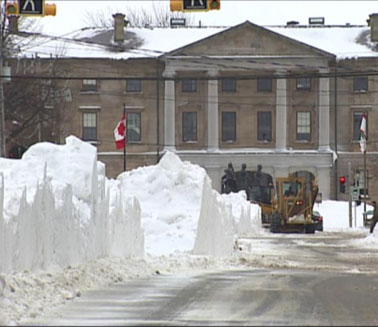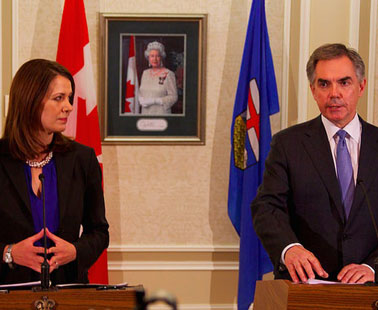Week of May 3—9 full of conceivably instructive democratic elections for Ontario political junkies
Apr 24th, 2015 | By Counterweights Editors | Category: In Brief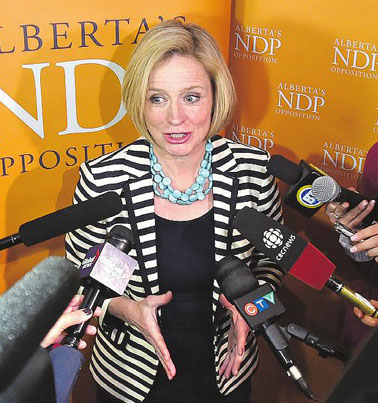
Alberta NDP Leader Rachel Notley, talking to the media after the Alberta Budget 2015, has emerged as a forceful and articulate voice on the left of Alberta provincial politics. Photograph by: Ed Kaiser, Edmonton Journal , National Post.
Not much more than a week from now, political junkies in Canada’s most populous province of Ontario will be able to wend their arrogant ways through a maze of conceivably instructive local, regional, and international democratic elections :
(1) At least a local prelude to the wider excitement will start on Sunday, May 3, when members of the Ontario Progressive Conservative (PC) Party first vote in their three-stage leadership election. For those of us who are not now and have never been PC Party members, it will be a strictly mental event – Â and all the more suitable as a kinder and gentler begining.
(2) Following the low-key, gradually building-up model, a provincial general election will be held in Prince Edward Island on Monday, May 4. PEI is at the opposite end of the Canadian provincial spectrum from Ontario. Â It is the least populous province (with a mere 147,000 people : Ontario currently has 13.7 million).
(3) After the PEI warm-up what just may be an altogether fascinating provincial general election will be held in Alberta on Tuesday, May 5. Calgary Mayor Naheed Nenshi has been critical of Alberta PC Premier Jim Prentice for calling an “unnecessary” early election in the first place. And as of this past Monday, Mayor Nenshi was opining: “You know, so far I gotta say this election has been a bit Seinfeldian.” Â The craziest question, however, is will some twisted Wildrose-NDP coalition finally take over the government of Canada’s fourth-most-populous and first-most-oil-rich province of almost 4.2 million people? And , almost even crazier, it seems that the latest poll is actually putting Rachel Notley’s Alberta New Democrats ahead of both the PCs and Wildrose!)
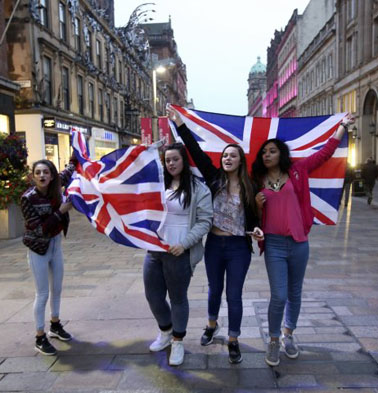 (4) Wednesday, May 6 will be a no doubt welcome day of rest. But on Thursday, May 7 there will be a big-time general election in Canada’s former mother country of the United Kingdom. Scotland voted not to secede from the UK last September, but the Scottish National Party may be a key coalition partner when the 2015 UK Â election is over. Yet for who or whom, etc? Meanwhile, note this characteristic April 22 English conservative lament from The Telegraph : “A strange disease is spreading, convincing the world that Ed Miliband is our next PM … otherwise sensible people are gripped by a belief that the maths favours Labour.”
(4) Wednesday, May 6 will be a no doubt welcome day of rest. But on Thursday, May 7 there will be a big-time general election in Canada’s former mother country of the United Kingdom. Scotland voted not to secede from the UK last September, but the Scottish National Party may be a key coalition partner when the 2015 UK Â election is over. Yet for who or whom, etc? Meanwhile, note this characteristic April 22 English conservative lament from The Telegraph : “A strange disease is spreading, convincing the world that Ed Miliband is our next PM … otherwise sensible people are gripped by a belief that the maths favours Labour.”
(5) Back on this side of the Atlantic, on the same Thursday, May 7 further members of the Ontario PC Party will vote in the second stage of their three-stage leadership election … Â perhaps while contemplating what happened in the UK election a mere five hours before. (If you vote at 7 PM in Ontario, eg, that will be 12 midnight in the UK, where the election may have already been decided.. The trick works even better in Vancouver, where 12 midnight in London, England is just 4 PM on another hip rainy afternoon.)
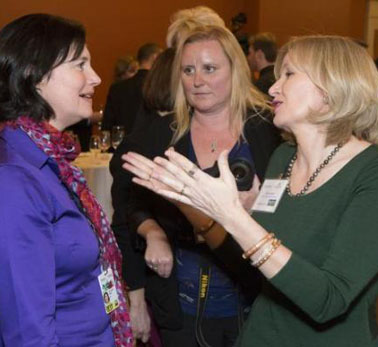
CBC environment reporter Margo McDiarmid (l) , said to be chatting with Ms. Harper (r – ie Laureen Teskey Harper, wife of Canadian prime minister, Stephen Harper) at recent Women for Nature Hill reception in Ottawa.
(6) On Saturday, May 9, the Ontario PC Party will announce the winner of the three-stage leadership election – either the “establishment candidate,” provincial MPP Christine Elliott from Whitby-Oshawa, or the “outsider candidate,” federal MP Patrick Brown from Barrie. Will anyone who is not a member of the Ontario PC party care? Â Maybe. Maybe not.
Meanwhile again, for more on each of the six parts of the cycle above, click on “Read the rest of this page” and/or scroll below … Note as well that one of our favourite Ottawa journalists, Lawrence Martin, believes Stephen Harper, for his own advantage at any rate, should have called an early federal election, just like Jim Prentice in Alberta. And that might explain why we’re still hearing rumours that an early federal election will in fact be called this Sunday – the day after tomorrow as I write. We don’t believe this at all ourselves. But it does make the weekend more interesting to think about.
I. Ontario PC Party leadership contest
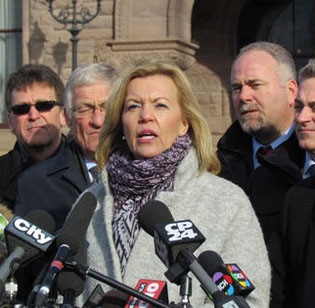
Ontario PC leadership candidate Christine Elliott with her supporters announces her economic platform outside Queen's Park on Thursday, March 5 2015. (ANTONELLA ARTUSO/Toronto Sun).
For a top 10 review of what has also – until what may or may not prove to be the Patrick Brown breakout most recently – seemed a bit of a Seinfeldian political race, consult :
FEB 18 – Ontario PC Leadership Race Seems Murky, Â But History Offers Some Lessons For The Party.
MAR 1 – Â Patrick Brown sells more than 40,000 Ontario PC memberships … The Barrie MP has “history on his side” according to a senior Conservative who said the past four winning PC leadership candidates have sold the most party memberships …
MAR 4 – Why it isn’t one member, one vote: How the Ontario PC leadership process will play out
MAR 16 – Is Patrick Brown the next great Tory hope for Ontario? … One of the candidates running to lead the Ontario Progressive Conservative Party is an unknown quantity to many outside his federal riding of Barrie …
APR 9 – Â MPP Monte McNaughton drops out of Ontario PC leadership race … London-area MPP endorses Barrie MP Patrick Brown …
APR 13 – Â Patrick Brown changes the game
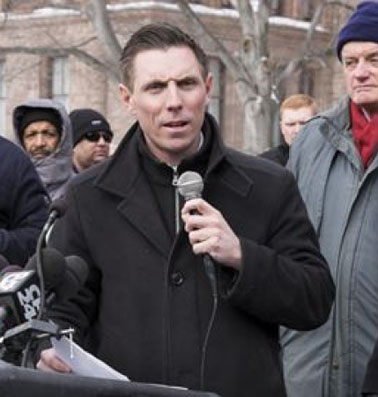
Patrick Brown addresses demonstrators protesting the Wynne Liberal government’s new sex-ed curriculum outside Queen's Park.
APR 14 – Â Patrick Brown ahead of Christine Elliot in PC leadership race: poll …
APR 16 – Conservative MP’s friendship with Narendra Modi in the spotlight
APR 18 – The right choice for the right … Â Christine Elliott has no skeletons in her closet …
APR 23 – Â Can Patrick Brown fix the Ontario PCs?
It seems unlikely that yesterday’s 2015 Ontario budget, compliments of finance minister Charles Sousa and Kathleen Wynne’s Ontario Liberal government (which the Ontario NDP is already saying has quickly become too conservative) will have much impact on the 2015 Ontario PC leadership race. But stranger things have happened.
II. The Prince Edward Island Election : Ho hum ????
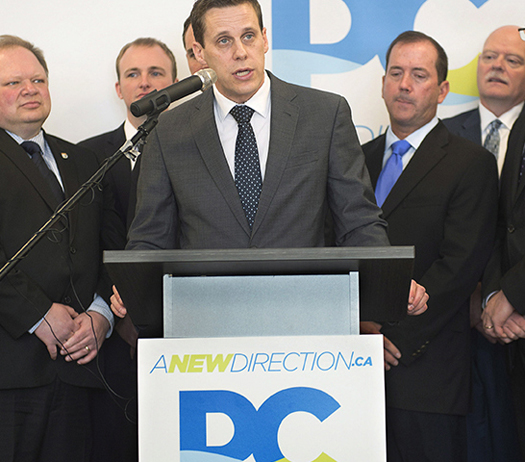
Prince Edward Island Progressive Conservative leader Rob Lantz, surrounded by candidates, announces the start of their election campaign in Cornwall, P.E.I., on Tuesday, April 7, 2015. THE CANADIAN PRESS/Andrew Vaughan.
Tiny and (very?) traditional PEI may be the last redoubt of the old two-party system in Canada. As Dean Jobb has recently explained in the Winnipeg Free Press : “Only one New Democrat has been elected to the provincial legislature, and that was almost two decades ago.”
Jobb has summarized his view of what will happen this year : “When Prince Edward Island voters go to the polls May 4 they will likely hand the ruling Liberals a third term in office. But the party’s comfortable majority – Â it entered the campaign holding 20 of 27 seats in the legislature – Â appears certain to evaporate.”
The PEI Liberals are running with a new leader, Wade MacLauchlan, in an effort to dampen allegations of scandal over former Liberal Premier Robert Ghiz’s involvement in “a failed initiative to make the Island a centre for electronic banking and online gaming” and “an earlier program to encourage immigrants to invest in local businesses.”
A recent visit by Justin Trudeau to boost Mr. MacLauchlan’s prospects also highlighted local debates about the abortion issue. In principle, it seems, abortion is legally available in PEI, as in other parts of Canada. Yet as Dean Jobb also explains, in fact “no Island hospital or clinic will perform an abortion, forcing women to travel to other provinces for the procedure.”
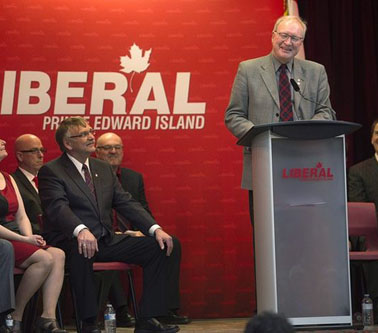
Prince Edward Island Premier Wade MacLauchlan addresses the crowd at his nomination meeting in West Covehead, P.E.I. on Monday, April 6, 2015. MacLauchlan announced that the provincial election will be held on May 4, 2015. THE CANADIAN PRESS/Andrew Vaughan.
A few weeks ago on the CBC News website Kevin Yarr explained the rather deep history behind the view that the Liberals will win again on May 4, 2015 : “Since the election of 1966 Islanders have handed the keys to government in an astonishingly regular pattern. Firstly, only the Liberals and Progressive Conservatives have formed governments. Secondly, they win three elections, and then they lose. The only exception was 1978, when the Liberals eked out a bare 17 to 15 majority to win a fourth term … This trend has held despite the vast waves of change that have rolled across the landscape.”
For the latest from the CBC site see also “Inside the PEI campaign with Kerry Campbell.” Both the NDP and the Greens at least run candidates in PEI elections. Along with Liberal leader Wade MacLauchlan, in 2015 Rob Lantz is leading the provincial PC s, Mike Redmond the New Democrats, and Peter Bevan Baker the Greens. In the last election in 2011 the Liberals won 22 seats with 51% of the popular vote, and the Conservatives won 5 seats with 40% of the vote. The Greens won 4% and the NDP 3%, but neither party managed to actually win a seat in the legislature at Charlottetown. The question in 2015 seems to be just how much change do the people of Prince Edward Island want? A bit but not too much, too soon, seems to be the answer? But how interesting it would be to discover it’s wrong.
III. Big Surprises in Alberta ?? Has Stephen Harper already brought more change to his home and (not quite) native province than he intended ????
Why did Premier Prentice, heir to an uninterrupted Alberta Progressive Conservative dynasty that goes all the way back to 1971, call an Alberta election for May 5, 2015 anyway?
It seemed his rivals to his right in the Wildrose party had been calmed by the apostasy of Danielle Smith. Mr. Prentice and his Alberta PC government appeared ready, willing, and able to face the province’s new hard times, in the wake of the big fall in world oil prices. Â And the last Alberta election took place only exactly three years ago today.
The most dramatic current evidence that Premier Prentice (not altogether unlike David Peterson in Ontario in 1990?) just may have made a gross miscalculation could be  Éric Grenier’s report of Tuesday, April 21 on his ThreeHundredEight.com site : “Wildrose moves ahead in new poll.”
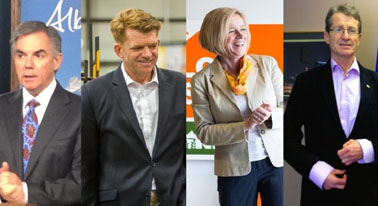
Alberta election bound, l to r : PC leader Jim Prentice, Wildrose leader Brian Jean, NDP leader Rachel Notley and Liberal leader David Swann. Will Premier Prentice really finish third?
The best thing for us to say here is just read Grenier’s almost impassioned article.
If you really can’t find time, his current projection of polling averages gives Brian Jean’s Wildrose party 35% of the province-wide vote and 41 seats (a bare majority in the 87-seat legislature is 44), followed by Rachel Notley’s Alberta New Democrats with 32% of the vote and 34 seats. Only then, in third place, do we have current Premier Jim Prentice’s Alberta PC Party, with 26% of the vote and 10 seats, followed by David Swann’s Alberta Liberals with a mere 4% of the vote and 2 seats.
(And then when you’re finished reading that, try “New Forum Research poll shows NDP pulling ahead in Alberta election race” – in the wake of last night’s leaders’ debate, it would seem. It is still hard not to believe that Mr. Prentice will finally pull something out of someone’s hat. But, yet again, maybe. Maybe not.)
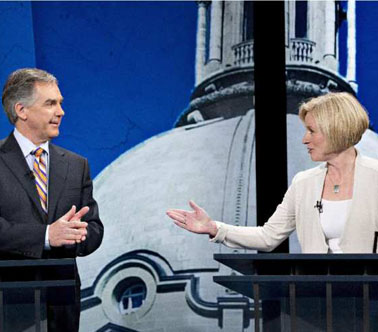
Alberta Progressive Conservative Leader Jim Prentice and NDP Leader Rachel Notley at the leaders debate in Edmonton on April 23, 2015. JASON FRANSON / THE CANADIAN PRESS.
Last night’s televised leadership debate in the Alberta election added a further surprise to the mix. See, eg : “Live chat: Alberta leaders square off in election debate” ; “Fiery debate as Alberta’s political leaders clash over health, corporate taxes and jobs” ; “Prentice, Notley go toe-to-toe; Jean, Swann sidelined” ; and “Braid: Notley shines in the best-ever Alberta leaders’ debate.”
No one is suggesting that Rachel Notley’s Alberta NDP stands a serious chance of winning on May 5. (Although note again the latest poll which puts her party first!) But the impressive Ms. Notley may help explain why her party is currently doing better than usual in the polls. (And see on this front, eg, a piece from early this month : “Irritated Albertans feeding rise of provincial NDP.”)
At the same time, three hours before the debate, Liberal leader Swann “lashed out at Notley for saying she would consider a coalition with the right-wing Wildrose if no party elected a majority government … Swann said supporters of both parties should be very concerned that their leaders ‘would completely abandon their core beliefs for the chance at forming government.’”
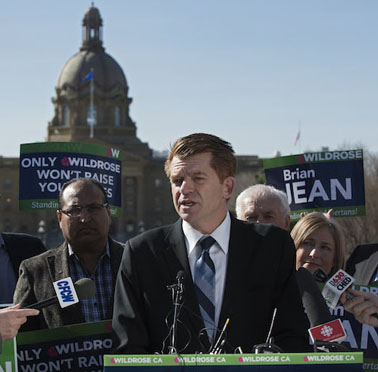
Wildrose leader Brian Jean releases his party's economic platform in Edmonton on Thursday April 9, 2015 ... Photograph by: Ed Kaiser , Edmonton Journal.
Those who only believe opinion polls might also want to consult “Overnight poll suggests NDP’s Rachel Notley won debate … Forty-four per cent of respondents chose Notley as the winner. Conservative Leader Jim Prentice was rated the victor by 25 per cent of respondents. Wildrose Leader Brian Jean was chosen by 16 per cent, and Liberal Leader David Swann by five per cent of respondents … Eleven per cent were undecided.”
Veteran Alberta journalist and commentator Don Braid at the Calgary Herald may have offered the most apt summary of the current state of play, post-debate : “Now, that was a heck of a debate – tough, lively, blunt without being vicious, often highly entertaining; a vivid reflection of divisions in the province and the rise of three almost equal political forces … And the winner is … Rachel Notley of the NDP, hands down …”
Mr. Braid went on : “It’s unlikely that Jean made a big breakthrough with a wider public beyond Wildrose supporters, but he did a solid job of defending the party’s core position as the party of cuts to government, rather than tax hikes for individuals. There’s a big Alberta market for that view … Even Prentice loyalists will have trouble seeing this debate as more than a draw for the PCs … Â The obvious goal for Prentice was to discredit the opposition parties and paint the PCs as the only possible government …It’s not at all clear that he achieved his aim. The last 10 days of this campaign are still crucially important.”
IV. 2015 UK election : the old Mother of Parliaments is changing … and maybe a lot ????
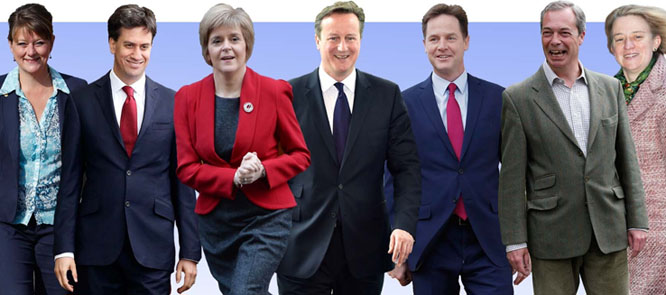
Take your pick, l to r : Plaid Cymru leader Leanne Wood, Labour leader Ed Miliband, Scottish National Party leader Nicola Sturgeon, Conservative leader David Cameron, Liberal Democrat leader Nick Clegg, UKIP leader Nigel Farage, and Green Party leader Natalie Bennett.
From an international standpoint – or even just taking the population size of the various electorates involved – the May 7 election in the UK is clearly the most important feature of the May 3—9 extravaganza. And in days long gone by there were those who might have said that a UK election was more important than a Canadian election, even in Canada.
But those days are “long gone by” (even if you still almost wouldn’t know it from some Canadian newspapers, sometimes!). For those of us who live in Canada the most important election over the week of May 3—9 will be the one in Alberta – Â and what it may or may not say about the Canadian federal election, almost certainly this October 19..
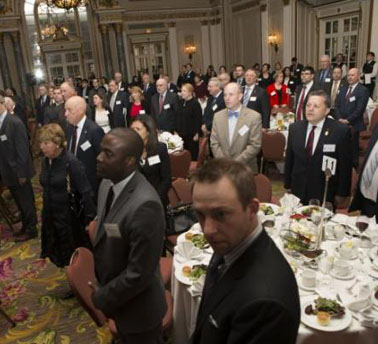
Many estimable legacies of the Westminster tutelage in Canada remain. Eg, the Château Laurier Ballroom in Ottawa was packed on Tuesday, March 31, 2015 for the Canadian Association of Former Parliamentarians dinner. The Hill Times photograph by Jake Wright.
For political junkies everywhere, however, the UK election remains quite fascinating – even if it has not, it seems clear enough, managed to acquire quite the same appeal for UK voters. Consider, eg, an almost randomly selected piece from The Guardian today : “Who will win the general election? The pollsters predict … Uncertainty remains, but with less than two weeks to the election, Britain’s top pollsters believe Ed Miliband now has more options to become PM.”
For this piece The Guardian asked various pollsters : “Based on today’s figures, who, between Ed Miliband and David Cameron, do you think is in a better position … ?” (And, just as a reminder if you are a really not-up-to-speed-on-UK-politics North American, Ed Miliband is the left-wing Labour Party leader and David Cameron is the right-wing Conservative leader and incumbent prime minister.)
The answer to this Guardian question from “Joe Twyman, head of political and social research at YouGov” is instructive : Â “YouGov conducts polls every day and with only two weeks remaining until election day the voting intention data is still broadly where it was at both the start of the campaign and indeed the start of the year: the two main parties are neck and neck, and neither has anything like the share they need to win a majority … The election campaign has so far failed to generate much excitement for large numbers of people and instead we appear to be left, to use a football metaphor, with Labour and Conservatives grinding out a scoreless draw and now playing for penalties …”
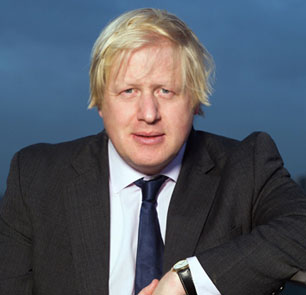
Some have been surprised that Boris Johnson, the irrepressible Mayor of London, was given the task of leading the Conservative party’s “ electoral charge in the north of England.” Mr Johnson himself is standing as an MP in the west London constituency of Uxbridge and South Ruislip.
Mr. Twyman went on : “However, I would suggest this may represent a risk for the Conservatives. Even if they could get 290 seats and if the Lib Dems manage 25, the existing coalition falls well short of a majority. Then what? A multi-party alliance with Ukip and the DUP? … Â Labour, on the other hand, could start with 20 fewer seats but then achieve a majority by partnering up with their historical bedfellows the Lib Dems and the SNP — even though they have ruled out a formal coalition with the latter … Â Of course it may very well be more complicated than that, but if the Conservatives continue to play for penalties, they might discover they’re up against the Germans. And Ed Miliband could end up in Downing Street. Maybe.”
We don’t want to go on too much longer here. (We’ve already gone on far too long.) But we’ll just point to two further blobs of potentially relevant information :
A. IN DAYS OF YORE BEFORE THE WAR ETC. Quite apart from Canada’s historic colonial tutelege in the old British empire, there appear to be some intriguing similarities between the 2015 UK election campaign and the 2015 federal election campaign in Canada that has already more or less begun …
At the moment, at least, it doesn’t look like any federal party in Canada can win a majority either. And the process of coalition building to form a new government in the United Kingdom this spring could set some intriguing examples (if not exactly precedents?) for what may also be happening in Canada this fall.
Note too, btw, that what is now known as the Constitution Act 1867 still has a preamble which declares that Canada has “a Constitution similar in Principle to that of the United Kingdom.”
(Or all the pollsters could be wrong. The Conservatives may actually win a majority – in both the United Kingdom and Canada – as sometimes seems to be yearned for at the Toronto Globe and Mail … Â trapped back in some late 19th century Gilbert and Sullivan romance … Â )
B. THE END OF THE OLD TWO-PARTY SYSTEM IN THE MOTHER OF PARLIAMENTS ? Those of us from all corners of the globe who grew up in the generation that followed the Second World War may still tend to think of British politics as essentially a traditional old two-party contest, between what in the first half of the 20th century became Labour on the left and the Conservatives on the right.
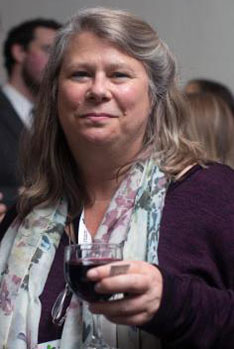
Alice Funke of Canada’s excellent Pundits Guide at a Broadbent Institute bash in Ottawa last month. Photograph by Tristan Brand.
Yet as Mr. Twyman’s calculations above suggest, British electoral politics in the early 21st century involves a more diverse concoction of two large and several smaller but significant political parties. To an ignorant North American on the Internet, the main current smaller parties appear to be :
* Scottish National Party (SNP). A bit like the Bloc Quebecois in Canada, and destined to win as many as almost 50 seats in the 650-member UK Parliament in 2015, according to some pollsters?
* Liberal Democrats (LIB). Updated version of the old 19th century Liberals in the UK. Or what the NDP was hoping would happen to the Liberals in Canada after the 2011 election. Junior coalition partners of David Cameron’s minority governing Conservatives since 2010 – Â predicted to win fewer seats than SNP in 2015.
* UKIP, ie the United Kingdom Independence Party. This essentially protest movement to the right of the Cameron Conservatives (a little but not very much like the Tea Party stateside) will take votes away from the Conservatives, and keep them from majority government. But UKIP, which lacks a geographically focused vote, will apparently not win many or even any seats in 2015. See, eg : “Nigel Farage is on course to lose in South Thanet and Ukip faces wipeout, experts predict.” (Mr Farage is the UKIP or Ukip leader.)
* Greens. Like Greens in continental Europe – and Canada of course. Predictions call for about 5% of the vote and maybe one seat?
* Plaid Cymru – or what Wikipedia calls “the Party of Wales, often referred to simply as Plaid.” The Welsh version of the SNP. It won 3 seats in the UK Parliament in the last election in 2010, and is predicted to keep them in 2015.
* Northern Ireland nowadays has 18 seats in the Parliament of the United Kingdom. In the 2010 election 8 of these seats were won by the Democratic Unionist Party or DUP, a voice of the Protestant Loyalist community; another 5 seats were taken by the more radically nationalist (and Catholic) Sinn Féin – although these members abstain from UK parliamentary activity as a protest against Northern Ireland’s continued membership in the UK ; another 3 Irish seats went to the less radically nationalist (and Catholic) Social Democratic and Labour Party (SDLP) ; and 1 seat went to the Alliance Party of Northern Ireland. If anyone knows where the final or 18th Northern Ireland seat went in 2010, we’d be much obliged if you’d send us a telegram.  Meanwhile, for 2015 see : “Will Sinn Fein MPs take their seats after the next election? … Some suggest the party could change its stance in the event of another hung parliament.”
AND MEANWHILE AGAIN, our best wish about all laudable democratic elections everywhere and at all times is always may the best candidates win. From the perspective of political junkies in anglophone Central Canada at least, there is quite a lot going on that is interesting these days. We probably should enjoy it while it lasts!
